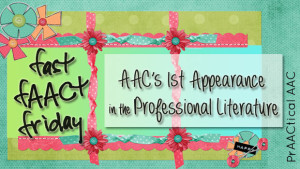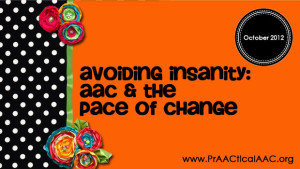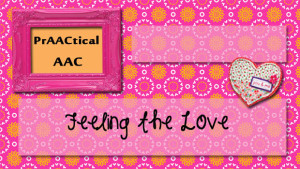November 15, 2013
by Carole Zangari -

Today’s Fast FAACt deals with the origins of AAC in clinical practice. Many people assume that AAC is a new field. While it certainly doesn’t have as long a history of as articulation or fluency disorders, neither did it just pop up in the last decade. Or the the previous one, or the one before that. When did AAC first appear in the professional literature? If you guessed the 80’s,you’re off by a bit. the 1970’s? Not quite. As far as we can tell the first published article on augmentative communication strategies was in the early 1950’s. The topic? Augmenting communication for people with aphasia. Here’s the reference: Goldstein, H., & Cameron, H. (1952) New method of communication for the aphasic patient. Arizona Medicine, 8, 17-21.
Filed under: PrAACtical Thinking
Tagged With: AT history, historical perspective, literature
October 4, 2012
by Carole Zangari -

Although the field of AAC emerged only in the last few decades, the notion of communicating in alternative ways is centuries old. In classical times, the use of manual communication by deaf individuals was referred to by Plato and documented in Europe during the Middle Ages. In North America, American Indian Hand Talk evolved over generations to allow cross-cultural communication between speakers of diverse languages. As a clinical/educational field, AAC has been described as evolving through a “bottom-up” mechanism. Individuals with congenital conditions that prevented the development of intelligible speech invented their own communication systems long before teachers, therapists, and clinicians formalized instruction in alternative modes of expression. AAC users growing up in the forties and fifties tell of communicating through grunts, vocalizations, “air writing,” and eye movements, which, though effective in some contexts, were maddening in their limitations. Individuals who were fortunate enough to have access to habilitative and... [Read More...]
Filed under: PrAACtical Thinking
Tagged With: advocacy, change, historical perspective, ideas
February 12, 2012
by Carole Zangari -

Some people thrive on conflict. Not us. We’re happiest when things are running smoothly and everyone is getting along. Nonetheless, we’re secretly thrilled by the conflict that has erupted between apps and traditional SGDs. — Here’s what we love about this conflict. 1. We LOVE that the technology that launched this controversy has raised the public’s awareness of AAC as an option. AAC in the local papers and New York Times. AAC on 60 minutes and segments of the nightly news. No matter how you feel about apps versus traditional SGDs, you gotta love the fact that more people now know that there are tools out there for people with little or no functional speech. – 2. We LOVE that AAC technology has progressed to a point where there is something to argue about. When I started my AAC career, the Express 3 (PRC), Zygo 100 (Zygo), and the HandiVoice... [Read More...]
Filed under: PrAACtical Thinking
Tagged With: Apps, historical perspective, SGD, technology


